Episode 4 of Season 2 — Hosted by Emily Harwitz.
About this Episode
Skateboarding in the redwoods might seem unconventional, but it’s a thing. The nonprofit Skate Like a Girl (SLAG) hosts a sleepaway skate camp for women, trans, and nonbinary skaters—in the middle of Sequoia National Forest. We skated with SLAG in Santa Cruz and from the skate park ventured into the Forest of Nisene Marks with squad members Sam Mercado, Jai Ledesma, and Kim Woozy to talk skateboarding, nature, and building inclusive community. Turns out skate culture has some things in common with the redwood forest. Both inspire joy, resilience, and a sense of belonging. Read Episode Transcript
Visit skatelikeagirl.com to register for programs, including Women + Trans Skate Camp from August 8-12 or 15-19, 2022 (two sessions, registration opens May 7, 2022).
Music by Wavebreaker.
Follow Save the Redwoods League on Instagram @savetheredwoods
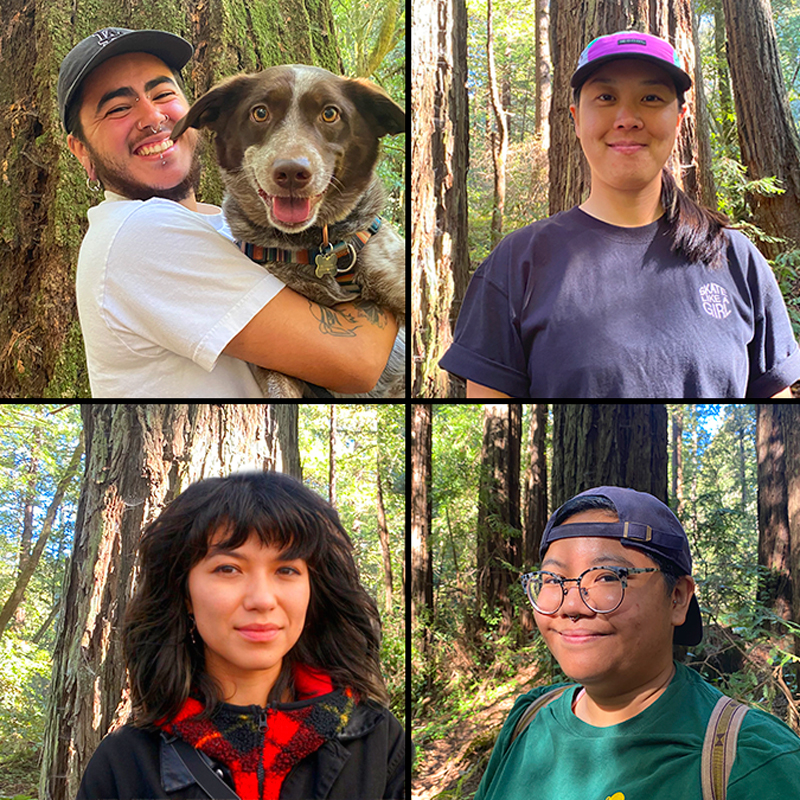
About our Guests
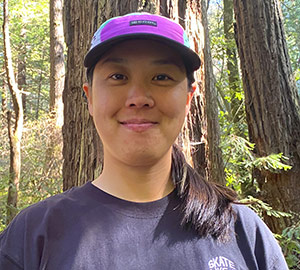
Kim Woozy (She/her) Tedx speaker, founder of MAHFIA.TV and Partner of the Women’s Skateboarding Alliance, Kim has over a decade of experience advocating for women in skateboarding. Finding her own strength, freedom, and self-expression through action sports, she is committed to creating accessible opportunities for everyone to participate.
Year Joined: 2014
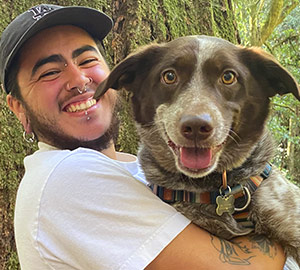
Jai Ledesma (They/he) Jai is a former Americorp Up2Us Coach and a lead program staff for Skate Like a Girl Bay Area. Coming from a small town, Jai moved to the Bay Area to help people find their confidence through skateboarding. They truly believe in being an individual and having your own style. Jai loves skateboarding and the determination it takes to do it.
Year Joined: 2018
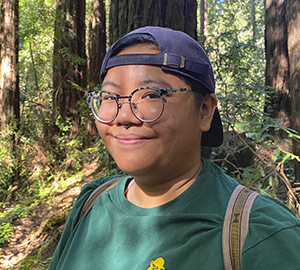
Sam Mercado (They/them) Growing up in Ventura, CA, Sam dreamed of learning to skate, but could not see themself doing it until a few years ago when they picked up a local zine showcasing non-traditional skaters. After attending Sk8 School later that year, they have been a participant with Skate Like A Girl ever since. Sam sees skateboarding as a powerful outlet for self-expression and an opportunity to safely practice being bold. Motivated by their belief that there are as many ways to be a skater as there are skaters, they are committed to providing a non-judgmental and encouraging space for anyone willing to stand on a board.
Year Joined: 2021
Episode 4: “Skate slow and live”
[Theme song intro]
00:05
Emily Harwitz: Welcome to Season Two of I’ll Go If You Go, a Save the Redwoods League podcast. We’re building community and illuminating how Californians from all walks of life think about and experience nature and conservation in the redwoods and beyond. I’ll Go If You Go — because when we explore together in community, the experience is all the more powerful.
00:27
Emily: The sun is shining, the birds are chirping and — ah, yes, the skateboarders are skating. What is it about skating… about being a skater — that makes it so cool?
Style? Heck, yeah. But more than that, skateboarding means freedom — to move, to express yourself, to goof around, and fall, and get back up again. But if the idea of slamming while learning ollies, kick flips, and grinds sounds intimidating … skating can also be just rolling around and having a good time. And that’s just what I did recently with my new friends from the org, Skate Like a Girl, one sunny day in Santa Cruz, California.
To Skate Like a Girl, skateboarding also means a diverse, inclusive community of awesome women, trans and non-binary people who love to build each other up and have tons of fun. On today’s episode, I’ll be talking to Skate Like a Girl’s Kim Woozy, Sam Mercado and Jai Ledesma.
Before we head into The Forest of Nisene Marks together, I joined a Skate Like a Girl meet-up at Mike Fox Skate Park in Santa Cruz. While some girls were dropping into the bowl, other skaters were cheering each other on, practicing tricks, or just rolling around in a straight line between the fences on the blacktop. Wait, that was me. I hadn’t been on a skateboard since early pandemic days, when I found an old skateboard, tried to do a moving Ollie, and fell and scraped my knees.
But at the meetup, I had so much fun. For once I didn’t feel any pressure to be good — or like I had to earn the right to be on a skateboard at a skate park. It was just laughs all around. Plus, that tingly good feeling in your feet when you skate. And if you’ve ever been on a board, you know what I mean. As I learned from Kim during our conversation, the physical act of skateboarding can actually be emotionally healing and good for your brain. And there’s plenty of neuroscientific research to back that up. Not to mention, skating gets you outside of moving, both of which are good for overall health and well-being.
I could go on about skateboarding, but let’s just hear it from the Skate Like a Girl squad. Grab your boards and I’ll meet you under the redwoods by the river in The Forest of Nisene Marks State Park — which is the ancestral lands of the Awaswas, Ohlone and Amah Mutsun people. Okay, catch you there!
02:52
Kim Woozy: My name is Kim Woozy, I use she/her pronouns. I’m 37 years old, and I am Chinese via Taiwan. My parents are from Taiwan. My grandparents are from China. I was born here in the Bay Area. And I have been skateboarding pretty long — but on and off. I got on a skateboard for the first time when I was like 12. Didn’t really know what to do, didn’t have community, and then ended up working in the skateboarding industry — and then picked it back up later, when I found Skate Like a Girl here in the Bay.
03:29
Jai Ledesma: My name is Jai. I am 24 years old. I am trans-masculine/non-binary. I am Mexican. I definitely connect to my roots and where I come from. And I’ve been skateboarding for 17 years. And I describe myself as a skateboarder even before all of that.
03:53
Sam Mercado: My name is Sam Mercado, I use they/them pronouns. And I am a first-generation Filipino American, first-generation college graduate. My first instance of wanting to learn how to skate was watching TV as a little kid (like three or four years old), and my family and I would watch The Simpsons together. And if you’ve seen it in the theme song, there’s Bart Simpson, and he’s like cruising around town, like jumping on cars and poles and stuff with his green skateboard. And I remember seeing that and thinking it was the coolest thing. So, I got my first board when I was six. Tried to pick it up, wasn’t able to stick with it. Until on my 25th birthday, my sibling Claw — shout out to Claw — got me a board. And a couple months later, I attended my first Skate Like a Girl program. And I’ve been skating ever since.
04:48
Emily: What is Skate Like a Girl?
04:50
Kim: Skate Like a Girl? We are a 501(c)3 nonprofit. We are in three chapters — three chapter cities: Seattle, Portland and the Bay Area. So, our mission is to create an inclusive community through skateboarding. And we emphasize leadership, social justice. And really, at the end of the day, we use skateboarding, as the platform or the vehicle, to develop young people, create leadership opportunities, build community, and ultimately just give folks a place where they get to be their whole selves and feel like they’re a part of something. And so skateboarding is the fun by-product. But at the core, we’re a community. And we do our best to create as many spaces as possible to invite folks who historically aren’t showing up in skateboarding. And often-times, those are the people who are also marginalized in other spaces in society.
05:49
Kim: What Skate Like a Girl really does is just practices what everyone preaches in skateboarding, which is really that the foundations of like modern skateboarding are all about nonconformity and individualism, and like, to skate with friends and have community — but at the end of the day, your relationship with your board is just completely unique to you. So with that being said, who am I to say, to be a skater you have to lookthis way, or like you have to dothese tricks? It’s really just — you deserve to be here just because you’re here.
06:20
Emily: And why skateboarding?
06:22
Kim: Well, it is just really fun. It’s a piece of wood with four wheels. Anyone can do it. And there’s something about it’s just so simple, that I think really brings people together. And once you kind of get past those initial fears, and I would say maybe some social norms or barriers — it’s addicting.
I mean, Push To Heal, they’ve done research around how skateboarding can be therapeutic, especially for young brains who’ve been through trauma (you can search them, Push To Heal) — but essentially, there’s something about the equilibrium like in your ear, the way that the motion is when you’re riding, you know, across concrete, the vibrations, like cause the liquids in your ear to vibrate in a certain way, and it actually releases endorphins. So like, we literally say, it’s fun, but it literally like is something that increases your joy and happiness.
There’s this experience of like accomplishment. And it is hard, like, you will fall, we all have fallen — a lot. But there’s something about that, where I think it’s addicting because you kind of feel a sense of pride and courage that sort of gets ingrained in you. And then it is really just sort of addicting to keep doing it. Because I think if you can learn things on a skateboard, you can take on any challenge in life,
07:37
Emily: How has skateboarding changed your relationship with the outdoors, or just being outside in general?
07:44
Kim: It’s one of the few activities where you have to be fully present to do it, there’s a lot of things you can multi-task. You see, nowadays, a lot of people, you know, walking while on their phone, or like waiting in line, or even riding your bike while looking at your phone or whatever. But skateboarding is truly one of those things where you are not going to do well if you’re trying to multi-task, but you’ve really got to be present. So, I think it’s become one of those few places where you’re fully present.
And I think the other piece just in the past few years, with the pandemic, really appreciating being outside and like the privilege that we have (you know, being able-bodied) to actually just roll around, you know?
Similarly, I think to Jai and Sam, like they worked in the skateboarding industry, there was a lot of inherited narratives around you have to be a certain skill level in order to be a skateboarder or part of the culture. And what I really appreciate about the past few years is that, you know, that concept has actually, you know, I would say, gone out the window for a lot of reasons.
But we’re all just so grateful to like, be outside, not on Zoom, because my job is largely on Zoom. So, I don’t know, I appreciate it so much. And I think we always say, you know, “thank you, skateboarding” at the end of our programs, because it is, like, genuinely a tool for us to connect with ourselves, connect with outside. And I think, you know, as we get deeper and deeper in these crazy innovations, especially living in Silicon Valley, being outside and being present is just absolutely necessary. And it just feels so good, you know? So important.
09:18
Emily: And speaking of being able-bodied, so when I was looking for location to come out and do this interview, I was looking for Redwood parks with pavement or ADA accessible trails — because that’s somewhere you can roll a skateboard on — which got me thinking about skateboarding with disabilities. Is that a thing at all?
09:36
Kim: Yeah, actually. So, with the introduction of the skateboarding into the Olympics for the first time in Tokyo, it also was introduced into the Paralympics. And so, there’s this amazing whole new kind of structure for folks who, you know, don’t have maybe all their limbs — and also other disabilities like There’s blind skaters, Deaf skaters (or hard of hearing skaters). So, it’s been really cool — because again, like, you know, it’s this, such a simple piece of wood with four wheels, but it really is adaptable in so many ways. And there are skaters that don’t have legs, that skate and they’re amazing. They’re way better than me. Like, it’s insane. It’s so inspiring to watch.
But it’s, I think the coolest thing is that a skateboard is more like a paintbrush to a Canvas versus like, you know, has all these requirements to do it. So, it’s kind of like, use it however you want. And like, that’s what makes it fun and cool.
[Sound of skateboard rolling on concrete]
10:46
Emily: I heard someone say “skate camp” earlier—
Sam: That was me.
Emily: — and I want to hear about it.
10:52
Sam: So skate camp, it’s as it sounds. If you’ve ever been to sleepaway camp as a kid… it was this week-long event from Monday through Friday, where…
Emily: Where was it?
Sam: It was in the Sequoia National Forest, at the YMCA Skate Camp, like parks and ramps and just like skateable facility is just like out by the Sequoia Lake and just in nature and surrounded by trees. And so last year, Skate Like a Girl held their first ever one for adult women and/or trans skaters. So it was about 60 campers and 20-ish staff and volunteers. And, um, yeah, we just all came together and hung out in the forest, and we skated sometimes, and we went to the lake, and we built campfires — and just had all of the, you know, traditional sleepaway camp experiences — but with an amazing community of women and/or trans skaters,
11:58
Jai: Like my face hurt from smiling so much. I never had a bad day. I never got to go to like, sleepaway camp, that wasn’t a thing. If you’re Mexican, you barely go to your, like, relative’s house. That’s how my mom was, so we couldn’t even afford summer camp.
12:12
Kim: Well, that was one of the goals of camp was to create that experience that a lot of people didn’t have growing up, right? Whether it was because of your family, or your culture. Just because you didn’t get to do that when you were younger doesn’t mean that it’s like, any less wanted or desired. So that’s what I loved is that we had adults — the average age I think was 33. We had adults literally like, we all were like 10 years old again. And I think we just kind of took everything that was our dream week, and just put it all into one. So, it was like nature — there’s no internet there, so we fully unplugged — and then skateboarding… and then of course, all the community activities… like singing and campfire and swimming and yoga. So, it was really like the dream world that we want to live in. I wish every day — every day could be like that.
13:00
Emily: Out there among the Giant Sequoias.
Kim: Yes, yeah!
Emily: That’s like the dream.
13:03
Kim: That’s what makes YMCA skate camp, specifically, just such a magical place. Because even if you took away all the skateboarding, it’s still magical, right? So you have, you know, that more traditional, like, kind of outdoor camping experiences. But it’s that, plus the skateboarding, which I think everyone left like, with some of their molecules rearranged in some way. Like we all got there as one person and we left as like some different version of ourselves. And like, that’s what made it so special.
13:32
Emily: I feel like skateboarding can seem pretty intense. But the way that I’ve heard it described here today, and what I saw at the meetup earlier, it seems so playful. And a space where you can really explore and you don’t have to be perfect on the board, because no one is and everyone has their own way of doing it. And it sounds like there’s a lot of… freedom of just being out there.
13:55
Kim: Absolutely. Yeah, that’s what we, I think people that skateboard know that. But again, it hasn’t always been portrayed that way. So we hope to make sure that’s really elevated, so anyone that has any sort of preconceived notion might come and actually experience something totally different. Because yeah, at the end of the day, it is fun, it’s play. And that’s something that everyone can relate to. And I think similarly with outdoor activities, you know, what you might see in mainstream is like someone summiting Mount Everest and you’re like, “Oh, my God, I could never do that.” But just going outside in your neighborhood on a walk, or in your local park, that’s being a hiker — that’s being outside. You know, it’s the same thing with skateboarding, where it’s like, if you have your board, and you’re stepping on it, that you’re a skateboarder.
14:42
Emily: I want to hear a little bit about what has surprised you all about learning to skate.
14:48
Jai: Yeah, like skateboarding made me be more social, have more friends. It also made me realize that our bodies can do so much physically. Skateboarding is so demanding emotionally. I’ve cried for like forgetting certain tricks. But at the end of the day, like, my friends are like “you got it,” “next try,” don’t like, “don’t stress about it” like, “just take a deep breath.” And don’t put that anger… frustration comes and goes. But at the end of the day, when you learn that trick or that line, or even just learn how to skate, you feel amazing. You feel like, “I can do anything.” I’ve seen that with adults, I’ve seen that with people that are like 60. And they’re just learning how to push, and their smile and that energy — you feel it.
15:33
Kim: You’re falling and failing all the time. And I think that’s ultimately what makes it so cool is because anyone is willing to fail consistently all the time. They’re failing more than they succeed, right? Because you try a trick 30 times and you land it once. Like, there’s something about that where, I think, I would love for all of us in our daily lives to just embrace failure that way.
15:54
Sam: And also, something else that surprised me is just that skateboarders are like super goofy.
15:58
Jai: Like, I don’t know what you’re talking about.
16:00
Sam: Like, well, as someone you know, who’s really shy and just like seeing like the image of a skateboarder being like super intense and gnarly. And it’s like, yeah, a lot of skateboarders are super gnarly, but then like, when they get off their board, they’ll just do the stupidest stuff. And I’m like…. but they’re just like, really fun to be around. And I wouldn’t have experienced that if I had never done stuff with Skate Like a Girl and felt like I could be part of that too.
16:22
Emily: I want to hear a little bit about injury. So if you’re falling that much, is there a way you can protect yourself?
16:28
Kim: Simplest answer… pads. Knee pads, elbow pads, wrist guards, helmets at all of Skate Like a Girl programs, you know, for youth 18 and under, we require helmets… we recommend full pads. For adults, too. I’m like your brain is valuable. And then just taking it slow. Like, you don’t have to be gnarly. A lot of people think that in order to skate, they have to like do some crazy things. But in reality, it’s like, we have a saying, “skate slow and live” rather than have like, “shred or die” you know, or “live fast, die young.” We’re like No, no, let’s live as long as possible. And that means being mindful of the risk assessment and like, what your brain is telling you.
17:06
[PSA]
[Save the Redwoods League PSA: Explore redwoods is a portal into California’s magical coast redwood and giant sequoia forest. Visit explorer woods.org to learn what’s available in more than 100 Redwood parks and plan an unforgettable adventure. From hiking and biking trails to camping to swimming holes This web based app will get you there. Visit exploreredwoods.org.]
17:29
Emily: We’re nearing the end of the episode, so you know what that means… It’s time for our lightning round!
Okay, we’re gonna go through two rounds of questions. So, I’m gonna start with Jai. What is your favorite Redwood Park?
17:45
Jai: Skate camp! Sequoia [National Park]. It’s magic. I love you, Kim — what is your favorite karaoke song?
17:50
Kim: I have to go with a WOF-themed song by 4 Non Blondes, “What’s Up?” because that is like the anthem of WOF and therefore the anthem of Skate Like a Girl. Alright, Sam — what’s your favorite condiment?
18:02
Sam: I don’t know. I’m a spicy mayo kind of person. Nice. Emily — what album do you have on repeat right now?
18:09
Emily: “Heaux Tales, Mo’ Tales” by Jazmine Sullivan. Okay, Jai, what’s a good movie you’ve seen recently?
18:16
Jai: I just went to go see the Beatles “Get Back” — their rooftop concert.
Sam: Oh, nice.
Jai: And now I’m in an endless spiral just listening to The Beatles. So, I recommend you go see it! Kim, what is your order when you go get Pho?
18:31
Kim: Ooh, that’s a good one. I thought you’re gonna say In and Out. I just go for the classic like beef slices, rare beef. And I definitely put Siracha on there, squeeze the limes and bean sprouts, all of it. And then definitely spring rolls. But I love Pho.
Jai: We should go!
Kim: We should go, yeah. Sam, what’s your favorite activity to do outside of skateboarding?
18:55
Sam: I really like to spend two hours just cooking a really good meal. It’s like skateboarding, where I feel like it grounds me, and it just is all consuming — because there’s like, you know, visuals and I like being able to chop things with my hands and like, see all the colors, and also just smell all the good smells. And I like being able to, you know, nourish people that I care about.
Kim: And it’s creative too.
Sam: And it also you know, I can use my favorite condiment when I cook.
Kim: Spicy Mayo.
Sam: What is your favorite article of clothing?
Emily: Socks
19:34
Kim: I notice you have cool socks.
19:36
Emily: Oh, thank you! Thank you all for being here today… Jai, Kim, Sam. Shout out to all the birds that have been chirping, chiming in, and the creek that’s running just behind us down the hill.
Jai, Kim, and Sam: Thank you, Emily!
Emily: During the Skate Like a Girl meet-up I won some skateboard trucks in a drawing. Trucks are those metal parts that attach the wheels to the board. I was so excited. But that also meant that I needed all the rest of the parts, too. I didn’t need to stress about it for long though, because Jai generously offered me a free deck and wheels. And Kim hooked me up with a free pair of skate shoes right then and there. Apparently, that’s a thing that happens in the skate community — sharing gear so everyone has access. Amazing. My heart is full from everyone I met so far through Skate Like a Girl and the way they welcomed me with open arms into the world of skating.
Huge thanks to Kim, Sam, Jai and Skate Like a Girl. One of my biggest takeaways from making this episode is that it’s never too late to learn something new.
So here’s my invitation to you. All you listeners who thinks skating is cool, but have been too afraid to try. You can be a skater on a skateboard. You can be whoever you want. You can skate however you want and wherever you want, even in the redwoods!
And like most good things in life, it’s even better with friends.
[Theme song fading out]
I’ll Go If You Go, a Save the Redwoods League podcast.
Through conversations with Black, Indigenous, and people of color who explore and work in the outdoors, we’re building community and illuminating how Californians from all walks of life think about and experience nature and conservation, in the redwoods and beyond.
About the host of Season 2
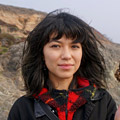
Be sure to follow our podcast in your preferred app to be notified when new episodes are posted!